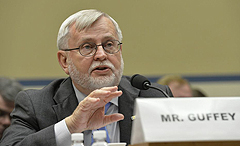Guffey Testifies Before House Committee
July 18, 2013
“The USPS was not broken in 2006 when Congress passed the PAEA [Postal Accountability and Enhancement Act]," President Cliff Guffey told a House committee on July 17. “As a consequence of that legislation, it is nearly broke now; but it still is not broken. Even today it delivers mail to every address in the United States, and delivers six days per week, at less than half the cost of mail in other industrialized nations.”
But plant closures and other cutbacks caused by the law have ravaged service, devaluing mail and further weakening the USPS, he said. “The situation will only get worse if postal management is forced or permitted to continue on its present course,” Guffey said. [Cliff Guffey's Written Testimony]

To prevent a collapse of the nation’s mail system, Congress must remove the PAEA requirement to pre-fund health benefits for future retirees, Guffey said. “With that and a few other changes, the Postal Service can continue to provide excellent and universal service to the American people.”
Network consolidation is really a plan for dismantling and weakening the Postal Service, he said. “The Postal Regulatory Commission concluded that net savings from all these cuts could be as low as $46 million. Although this may sound like a great deal of money, it is only about .06 percent of postal revenues,” he noted. (That’s six one hundredths of one percent!)
“Individual mail processing plants and post offices should not be judged in isolation,” he warned. “They are a necessary part of a universal service network... Without the network, none of the pieces will work.” he said.
To address the USPS crisis, Guffey said, Congress must:
- Repeal the PAEA’s pre-funding requirement;
- Require the USPS to provide overnight delivery of First Class mail in local delivery areas and prompt delivery of First Class mail everywhere;
- Refund USPS overpayments to federal pension accounts, and calculate Postal Service payments into based on USPS demographics;
- Lift the cap on postal rate increases;
- Allow the USPS to offer new goods and services.
Postmaster General Patrick Donahoe also testified at the hearing, where he reiterated calls for changes to employee health insurance. Guffey said discussions with the USPS could occur, but postal workers must remain in the Federal Employees Health Benefits (FEHB) program.
Rep. Adrian Smith and Joel Quadracci, CEO of a large printing company, also testified.
[written testimony of Rep. Adrian Smith (R-NE)]
[written testimony of Postmaster General Patrick Donahoe]
[written testimony of Joel Quadracci, Chairman, President & CEO of Quad Graphics]
Watch Hearing- [Part One] | [Part-Two]
Vote on Issa Bill Set for July 24
The July 17 hearing was a prelude to a committee vote on July 24 on a bill proposed by Chairman Issa.
The APWU called a draft of the bill “deeply disturbing,” pointing out that it would punish postal workers, privatize major portions of the USPS, and deprive the American people of vital services.
At the opening of the hearing, Rep. Issa announced changes to the bill, including the elimination of the requirement to re-open contract negotiations to immediately eliminate protection against layoffs. However, the revised bill would prohibit postal unions and management from negotiating protection against layoffs in future contracts, increase health insurance costs, limit collective bargaining rights, close post offices, stations and branches, consolidate plants and privatize operations.



